Get free scan and check if your device is infected.
Remove it nowTo use full-featured product, you have to purchase a license for Combo Cleaner. Seven days free trial available. Combo Cleaner is owned and operated by RCS LT, the parent company of PCRisk.com.
What is "Securingchecknow"?
Securingchecknow is a family of scam websites promoting Mac Heal Pro and other similar applications using scare tactics. It alerts visitors of fake threats that it has supposedly detected and endorses the app for their removal. Do not trust these deceptive sites or download/install software they advertise.
System cleaners and similar applications promoted by these websites are often fake and nonoperational, possibly even harmful. In most cases, users enter Securingchecknow sites due to having them force-opened by Potentially Unwanted Applications (PUAs) present on their devices.
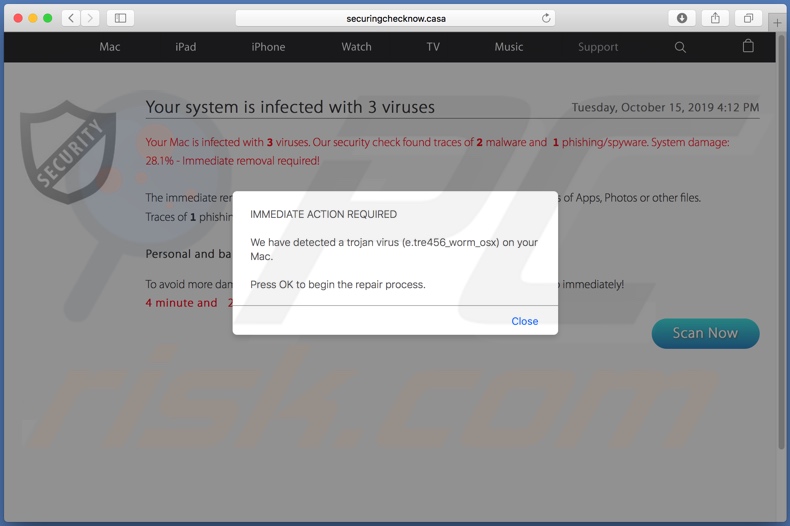
Securingchecknow first displays a pop-up window, which claims that a trojan virus (e.tre456_worm_osx) was detected on the Mac OS. The background page lists the date and time when additional issues were detected. The site has allegedly found three viruses (two malware and one phishing/spyware infection) within the system.
It urges users to take immediate action, as their system has been compromised. Additionally, it states that the visitor's data, personal, and banking information is at risk. Securingchecknow also shows a countdown timer, with time remaining until the damage becomes permanent.
The bottom of the web page states that this site is purely advertorial. I.e., designed for advertising purposes and has no connection to Apple or Microsoft. After the "Scan Now" button is clicked, Securingchecknow initiates a fake system scan and lists various 'issues'.
It states that the system is heavily damaged (at 33.2%) and there are three viruses present (Tapsnake, CronDNS, and Dubfishicv). Note, however, that Securingchecknow is a scam website - it has no scanning capabilities and all threats it finds are false. Clicking the "REMOVE VIRUSES NOW" button starts download of Mac Heal Pro.
Software promoted on these web pages are PUAs and are unable to perform any of the advertised functions. They also require activation (via a purchase), however, despite payment made or activation, they often remain nonfunctional. Qbit Mac Optimizer, MacEnizer, and K9-MacOptimizer are just some examples of unwanted applications similar to Mac Heal Pro.
In general, PUAs seem legitimate and often lure users to install by offering "useful" and "beneficial" features/capabilities, however, these functions rarely operate as promised and, in most cases, are nonoperational. The only purpose of all unwanted software/content is to generate revenue for the developers.
Regular users receive no value. PUAs can cause redirects to sale-oriented, untrustworthy, compromised and even malicious websites. These apps also hijack browsers and can deliver intrusive advertisement campaigns (pop-ups, surveys, banners, coupons, etc.).
Some have data tracking capabilities, which they use to monitor users' browsing activity (browsing and search engine histories) and gather their personal information (IP addresses, geolocations, and other details). This private data is then shared with third parties (potentially, cyber criminals) seeking to misuse it for financial gain.
In summary, PUAs can cause browser and system infiltration/infections and lead to serious privacy issues, financial loss, and even identity theft. To ensure device and user safety, remove all dubious applications and browser extensions/plug-ins immediately.
| Name | securingchecknow pop-up |
| Threat Type | Scam, Phishing, Mac malware, Mac virus. |
| Fake Claim | The pop-up message states that the system is infected and encourages users to download system cleaning software. |
| Serving IP Address | 155.138.244.155 |
| Promoted Unwanted Application | Mac Heal Pro |
| Related Domains | Full list below. |
| Symptoms | Your Mac becomes slower than normal, you see unwanted pop-up ads, you are redirected to dubious websites. |
| Distribution methods | Deceptive pop-up ads, free software installers (bundling), fake Flash Player installers, torrent file downloads. |
| Damage | Internet browser tracking (potential privacy issues), display of unwanted ads, redirects to dubious websites, loss of private information. |
| Malware Removal (Windows) |
To eliminate possible malware infections, scan your computer with legitimate antivirus software. Our security researchers recommend using Combo Cleaner. Download Combo CleanerTo use full-featured product, you have to purchase a license for Combo Cleaner. 7 days free trial available. Combo Cleaner is owned and operated by RCS LT, the parent company of PCRisk.com. |
Scam websites are common and most promote suspicious and/or fake applications. For instance, security5service.com, progressstream.com, and apple.com-guard-device.live are just some examples of similar web pages to Securingchecknow.
They typically trick users into installing their fake apps by warning them of various 'threats' and 'issues'. While the products these sites offer may seem legitimate, it is unlikely that they are capable of operating as advertised (i.e., they have no scanning, virus removal, optimization, or other capabilities).
How did potentially unwanted applications install on my computer?
Some PUAs have "official" download websites, however, they can also be inadvertently installed together with other programs. This marketing method of pre-packing normal software with unwanted or malicious content is called "bundling".
Rushing download/installation processes (e.g. ignored terms, skipping steps, using pre-set options, etc.) increases the risk of allowing deceptive or bundled software onto devices. Intrusive advertisements can also proliferate PUAs. Once clicked, they execute scripts to download/install PUAs without users' consent.
How to avoid installation of potentially unwanted applications
Research software and content to verify its legitimacy, before downloading/installing. Use only trustworthy and verified download channels. Peer-to-Peer sharing networks, unofficial and free file-hosting sites, third party downloaders and similar sources are untrusted and should not be used.
Download and installation processes should be treated with caution. Read the terms, explore all possible options, use the "Custom/Advanced" settings, and opting-out of downloading/installing supplementary apps, tools, features, etc.
Intrusive advertisements usually seem legitimate and harmless, however, they often redirect to dubious web pages (e.g. pornography, adult-dating, gambling, etc.). If you encounter these ads/redirects, inspect the system and immediately remove all suspect applications and/or browser extensions/plug-ins.
If your computer is already infected with PUAs, we recommend running a scan with Combo Cleaner Antivirus for Windows to automatically eliminate them.
Text presented in "Securingchecknow" scam website pop-up window:
IMMEDIATE ACTION REQUIRED
We have detected a trojan virus (e.tre456_worm_osx) on your Mac.
Press OK to begin the repair process.
Screenshot of "Securingchecknow" background web page:
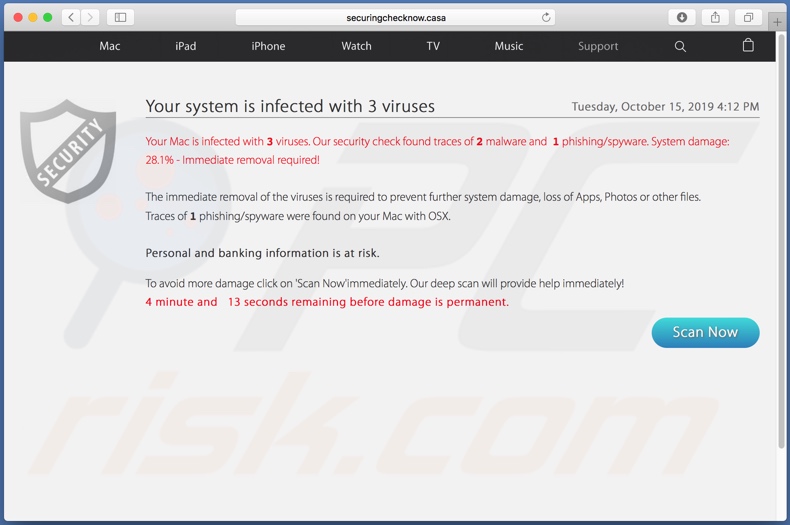
Tex presented on this web page:
Your system is infected with 3 viruses Tuesday, October 15, 2019 4:12 PM
Your Mac is infected with 3 viruses. Our security check found traces of 2 malware and 1 phishing/spyware. System damage: 28.1% - Immediate removal required!
The immediate removal of the viruses is required to prevent further system damage, loss of Apps, Photos or other files.
Traces of 1 phishing/spyware were found on your Mac with OSX.Personal and banking information is at risk.
To avoid more damage click on 'Scan Now'immediately. Our deep scan will provide help immediately!
4 minute and 25 seconds remaining before damage is permanent.Scan Now
Disclaimer: All trademarks are the property of their respective owners. This page is not affiliated with Apple or Microsoft. Page is an advertorial. Please read our full disclaimer here
Screenshot of fake scan results provided by "Securingchecknow":
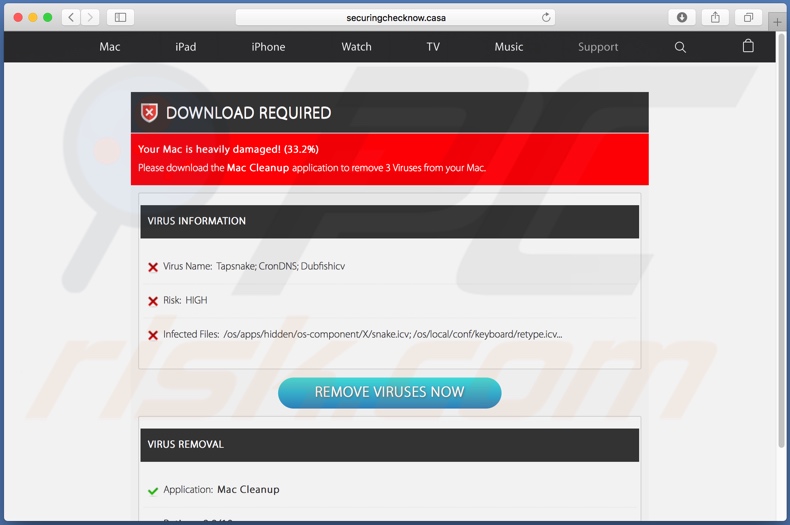
Tex presented in this web page:
DOWNLOAD REQUIRED
Your Mac is heavily damaged! (33.2%)
Please download the Mac Cleanup application to remove 3 Viruses from your Mac.
VIRUS INFORMATIONVirus Name: Tapsnake; CronDNS; Dubfishicv
Risk: HIGH
Infected Files: /os/apps/hidden/os-component/X/snake.icv; /os/local/conf/keyboard/retype.icv...
REMOVE VIRUSES NOW
VIRUS REMOVALApplication: Mac Cleanup
Rating: 9.9/10
Price: Free
Disclaimer: All trademarks are the property of their respective owners. This page is not affiliated with Apple or Microsoft. Page is an advertorial. Please read our full disclaimer here
Appearance of Securingchecknow scam (GIF):
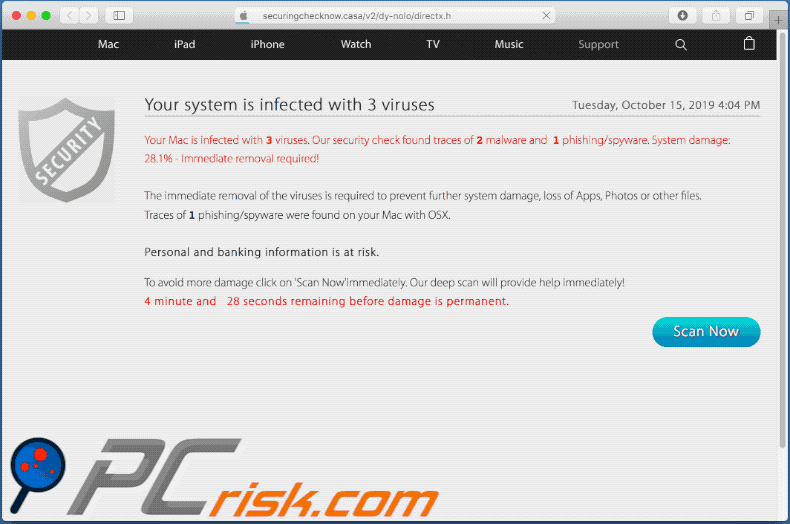
List of domains related to the Securingchecknow family:
| securechecksnow[.]icu | securingchecknow[.]surf |
| securingchecknow[.]best | securingchecknow[.]tech |
| securingchecknow[.]casa | securingchecknown[.]pw |
| securingchecknow[.]club | securingchecksnow[.]club |
| securingchecknow[.]fun | securingchecksnow[.]mobi |
| securingchecknow[.]host | securingchecksnow[.]monster |
| securingchecknow[.]london | securingchecksnow[.]online |
| securingchecknow[.]monster | securingchecksnow[.]pro |
| securingchecknow[.]online | securingchecksnow[.]store |
| securingchecknow[.]site | securingchecksnow[.]xyz |
Screenshot of Mac Heal Pro application installer:
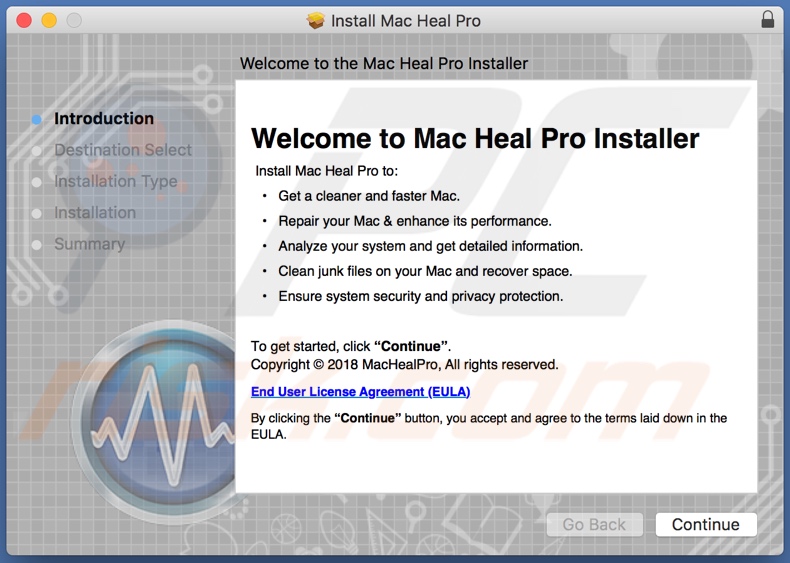
Screenshot of Mac Heal Pro application:
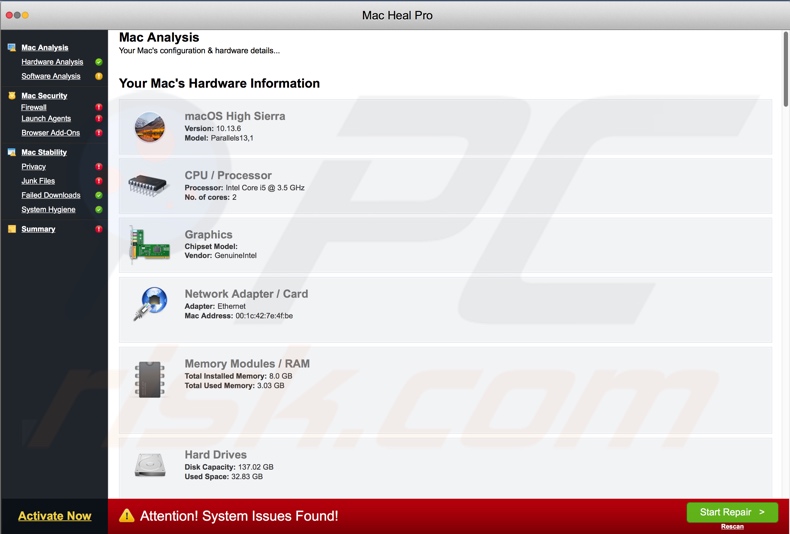
Instant automatic malware removal:
Manual threat removal might be a lengthy and complicated process that requires advanced IT skills. Combo Cleaner is a professional automatic malware removal tool that is recommended to get rid of malware. Download it by clicking the button below:
DOWNLOAD Combo CleanerBy downloading any software listed on this website you agree to our Privacy Policy and Terms of Use. To use full-featured product, you have to purchase a license for Combo Cleaner. 7 days free trial available. Combo Cleaner is owned and operated by RCS LT, the parent company of PCRisk.com.
Quick menu:
- What is securingchecknow pop-up?
- How to identify a pop-up scam?
- How do pop-up scams work?
- How to remove fake pop-ups?
- How to prevent fake pop-ups?
- What to do if you fell for a pop-up scam?
How to identify a pop-up scam?
Pop-up windows with various fake messages are a common type of lures cybercriminals use. They collect sensitive personal data, trick Internet users into calling fake tech support numbers, subscribe to useless online services, invest in shady cryptocurrency schemes, etc.
While in the majority of cases these pop-ups don't infect users' devices with malware, they can cause direct monetary loss or could result in identity theft.
Cybercriminals strive to create their rogue pop-up windows to look trustworthy, however, scams typically have the following characteristics:
- Spelling mistakes and non-professional images - Closely inspect the information displayed in a pop-up. Spelling mistakes and unprofessional images could be a sign of a scam.
- Sense of urgency - Countdown timer with a couple of minutes on it, asking you to enter your personal information or subscribe to some online service.
- Statements that you won something - If you haven't participated in a lottery, online competition, etc., and you see a pop-up window stating that you won.
- Computer or mobile device scan - A pop-up window that scans your device and informs of detected issues - is undoubtedly a scam; webpages cannot perform such actions.
- Exclusivity - Pop-up windows stating that only you are given secret access to a financial scheme that can quickly make you rich.
Example of a pop-up scam:

How do pop-up scams work?
Cybercriminals and deceptive marketers usually use various advertising networks, search engine poisoning techniques, and shady websites to generate traffic to their pop-ups. Users land on their online lures after clicking on fake download buttons, using a torrent website, or simply clicking on an Internet search engine result.
Based on users' location and device information, they are presented with a scam pop-up. Lures presented in such pop-ups range from get-rich-quick schemes to fake virus scans.
How to remove fake pop-ups?
In most cases, pop-up scams do not infect users' devices with malware. If you encountered a scam pop-up, simply closing it should be enough. In some cases scam, pop-ups may be hard to close; in such cases - close your Internet browser and restart it.
In extremely rare cases, you might need to reset your Internet browser. For this, use our instructions explaining how to reset Internet browser settings.
How to prevent fake pop-ups?
To prevent seeing pop-up scams, you should visit only reputable websites. Torrent, Crack, free online movie streaming, YouTube video download, and other websites of similar reputation commonly redirect Internet users to pop-up scams.
To minimize the risk of encountering pop-up scams, you should keep your Internet browsers up-to-date and use reputable anti-malware application. For this purpose, we recommend Combo Cleaner Antivirus for Windows.
What to do if you fell for a pop-up scam?
This depends on the type of scam that you fell for. Most commonly, pop-up scams try to trick users into sending money, giving away personal information, or giving access to one's device.
- If you sent money to scammers: You should contact your financial institution and explain that you were scammed. If informed promptly, there's a chance to get your money back.
- If you gave away your personal information: You should change your passwords and enable two-factor authentication in all online services that you use. Visit Federal Trade Commission to report identity theft and get personalized recovery steps.
- If you let scammers connect to your device: You should scan your computer with reputable anti-malware (we recommend Combo Cleaner Antivirus for Windows) - cyber criminals could have planted trojans, keyloggers, and other malware, don't use your computer until removing possible threats.
- Help other Internet users: report Internet scams to Federal Trade Commission.
Share:

Tomas Meskauskas
Expert security researcher, professional malware analyst
I am passionate about computer security and technology. I have an experience of over 10 years working in various companies related to computer technical issue solving and Internet security. I have been working as an author and editor for pcrisk.com since 2010. Follow me on Twitter and LinkedIn to stay informed about the latest online security threats.
PCrisk security portal is brought by a company RCS LT.
Joined forces of security researchers help educate computer users about the latest online security threats. More information about the company RCS LT.
Our malware removal guides are free. However, if you want to support us you can send us a donation.
DonatePCrisk security portal is brought by a company RCS LT.
Joined forces of security researchers help educate computer users about the latest online security threats. More information about the company RCS LT.
Our malware removal guides are free. However, if you want to support us you can send us a donation.
Donate
▼ Show Discussion